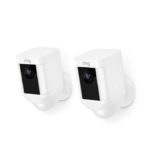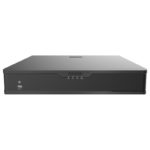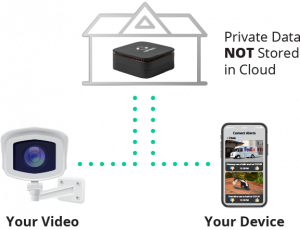Surveillance cameras are widely available and relatively easy to install. However, if you want to search and access recent recorded events from your cameras then you either need a cloud service, network video recorder, and a new category of device called a smart camera hub. We have collected tons of feedback from pro installers, commercial business owners, and home owners on the pros can cons of these options. Below is a summary of our feedback so far.
Cloud Camera Systems
- Monthly fees keep initial costs low
- Access to video from apps is usually low resolution, costs can skyrocket to $40 per month per camera for high res/4k video
- Video data is stored on cloud systems that can be hacked into. Sensitive personal video data can be at risk.
- Cloud camera systems transfer video data to the cloud over your network, so your home or business network speeds can slow down further if you rely on these systems.
- Monthly fees can add up over time
- Limited to proprietary camera systems which does not provide flexibility

Cloud camera systems can generally be accessed from anywhere, but storing data in “the cloud” can have expensive monthly fees and have privacy risks. You can connect your camera to the internet and the cloud camera will automatically transfer your live and recorded video to a cloud based server. Here you can usually use apps to access the video. The video is transferred over your network so these systems can slow your network down. Also, since your video is stored on cloud based systems it can be susceptible to hacking. Some cloud based camera systems have even been hacked providing bad actors direct access to live video in peoples homes.
Network Video Recorders
- Store video locally so do not have privacy risks that cloud video services have.
- Generally do not have intelligent alerts or AI, and require manually reviewing your video history
- Usually are limited to certain camera systems.

Network video recorders have traditionally been used for video surveillance systems. Network video recorders store the data locally on a hard drive so they do not have the same privacy concerns, but their initial costs may be a bit higher. They are able to store video locally which keeps your data private, but most do not have intelligent alerts or AI. This means that if something happened you need to manually review the hours of video feed to try to find it.
Smart Camera Hubs or Advanced Network Video Recorders
- Store video locally keeping your video private
- Process real-time intelligent alerts acting as a virtual guard that tell you what is happening at your home or business.
- Do not eat up your network bandwidth significantly .
- Have more affordability options with a monthly rate or a one time fee (for lifetime of hub).
- Support many camera brands and types providing flexibility and affordability,

Smart camera hubs (also called advanced network video recorders) are a new category where advanced software processes camera video feeds, AI analyzes the video with real-time alerts, then stores the alerts and full video history on the device. This keeps the video safe and is more secure than cloud camera systems. Smart camera hubs also can process high resolution video (up to 4k) without impacting your home or business internet bandwidth significantly. This can free up much more bandwidth than cloud base systems.
